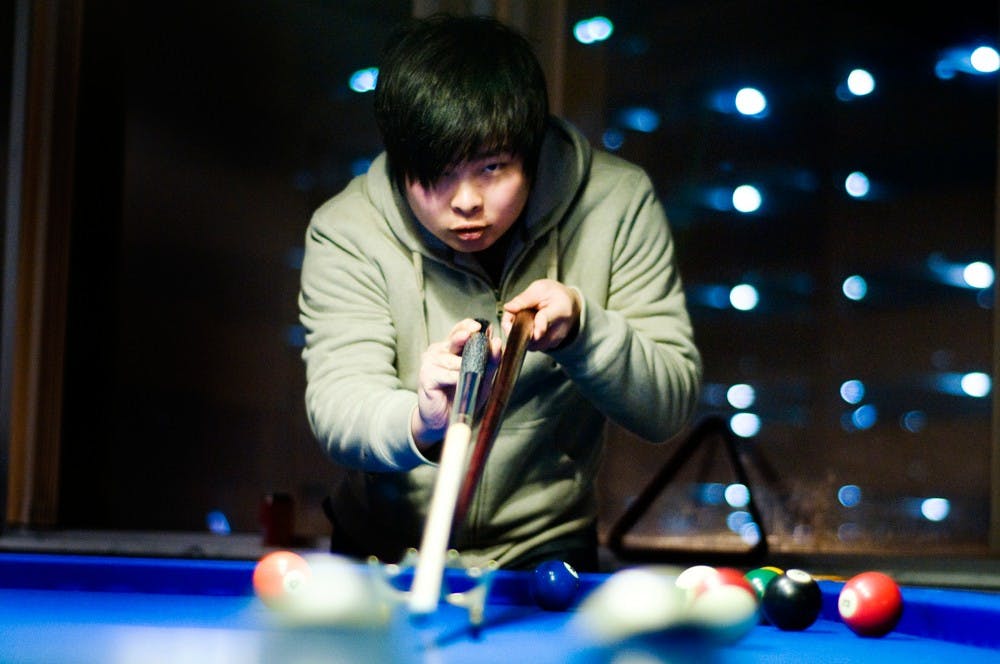When marketing junior Chester Cao decided last year to start a business with his friends, they knew they wanted to bring a taste of home to East Lansing.
In China, Cao and his friends took part in different types of entertainment than some of their American peers — singing karaoke and playing billiards and Mahjong, a traditional Chinese card game.
The inspiration led them to establish Heart Beats, 301 M.A.C. Ave., a combination billiards, karaoke and Mahjong lounge that opened December 2011.
“The motivation, it all comes from how we really do the entertainment,” Cao said.
In the planning process for the lounge, Cao and his friends saw East Lansing was filled with international students and rich business potential.
“We have actually drawn up a trend line (to) see how the international students are coming,” he said. “It’s going … vertically like a mountain for these two years.”
The lounge started by Cao and his friends is among a number of businesses and restaurants that have opened in East Lansing in recent years catering to both international students and those with an interest in international food.
The increasing trend in businesses targeting international tastes is a direct reflection of a rising presence of international students on MSU’s campus, East Lansing Planning and Community Development Director Tim Dempsey said.
“One of the things we’re seeing is more demand for services and retail options that cater to foreign students,” he said.
The boom in international students on MSU’s campus goes back to about 2006, said Peter Briggs, the director of MSU’s Office for International Students and Scholars, or OISS.
Briggs said since then the number of Chinese students on campus also has increased dramatically.
In the fall of 2006, MSU had about 3,526 international students, including 600 from China,
according to statistics from OISS.
By 2011, 5,898 international students had flocked to campus, and 3,012 of those students were from China, according to those statistics.
Dempsey said with new businesses developing in the city and more international students coming to campus, officials are starting to take notice.
“From our perspective, we’re glad to see this growing population,” Dempsey said.
Businesses
Among locations that cater to an international audience, Dempsey said Heart Beats is a perfect example of a location crafted to meet a specific demand.
“The business is being developed and operated by those very people — foreign-born students,” he said.
Economics junior Zeming Teng — a native of China who played billiards at Heart Beats last Friday night — said the lounge brings Chinese entertainment directly into East Lansing, something that was lacking before.
“We have a pool culture back in China,” he said. “Right here is some kind of lack of those things.”
Like Cao, other students also have decided to start their own businesses, including Bowen Kou, a supply chain management junior and president of Straight A Bookstore, 541 E. Grand River Ave.
Support student media!
Please consider donating to The State News and help fund the future of journalism.
The used textbook store originally was ran out of Kou’s 11th-floor dorm room in Hubbard Hall starting in 2009 before Kou’s friends joined the operation and raised enough money to rent the store’s current location.
“I used to sell textbooks to my friends and buy back from them,” he said. “I saw it could be a good way to sell textbooks.”
Now, the store sells books to hundreds of students during the initial weeks of the semester, Kou said.
Restaurants
Sushi Ya, 529 E. Grand River Ave., opened up in East Lansing about six years ago, said Leigh Beckmeyer, the restaurant’s assistant manager. Since that time, she said store management definitely has noticed a jump in the number of international students who frequent the business.
Beckmeyer said the location’s mix of Korean and Japanese cuisine has helped draw in an international clientele.
“I think it could both be the cuisine and the atmosphere — there’s a lot of fusion in the atmosphere,” she said.
Since international students tend to live together at MSU, Beckmeyer said groups of friends often return to the restaurant together.
“Word of mouth follows, and so they go to those places,” she said.
But, the restaurant continues to be popular with students from across campus, she said.
Some businesses that serve international cuisine came to East Lansing for factors besides reaching an international student population.
Shua Kue, the human resources manager for No Thai!, 403 E. Grand River Ave., said the restaurant’s management was drawn to East Lansing by the atmosphere of the town in general, not specifically a large concentration of international students.
The East Lansing location opened July 2011. The business also has three locations in Ann Arbor.
Kue said the restaurant has attempted to target “the entire university atmosphere” as opposed to one group of students.
“The way it’s run and the whole overall perspective of it, I’m sure a lot of people don’t expect a fast food Thai restaurant,” she said.
Whether businesses and restaurants attempt to target international students or not, East Lansing and MSU officials have noticed the increasing trend and plan to continue addressing it in the future, Briggs said.
“I think they’ve had an impact on campus just by the sheer numbers,” he said. “I think there’s kind of a learning curve.”
Discussion
Share and discuss “Cultural commerce” on social media.


